Page Content
Teachers As Builders Of Community: Engaged Citizenship
 You must prove how precious such a spirit of devotion is, not by listening to the praise of heroes, but by daily appreciating the city’s greatness, by falling in love with her as you see her, by realizing that her greatness is due to men of courage who know their duty and discipline themselves in its performance. Judging freedom to be happiness, and courage to be the creator of freedom, it remains for you not to fear any risks, but to rival what these men have done.
You must prove how precious such a spirit of devotion is, not by listening to the praise of heroes, but by daily appreciating the city’s greatness, by falling in love with her as you see her, by realizing that her greatness is due to men of courage who know their duty and discipline themselves in its performance. Judging freedom to be happiness, and courage to be the creator of freedom, it remains for you not to fear any risks, but to rival what these men have done.
—Pericles (on the importance of building society and engaging in public affairs in a democracy), as reported in Thucydides, II, 35–41, A History of the Peloponnesian War
Teachers are proud of their work in the classroom, as school administrators and at central office. Everyone involved in Alberta’s education system works together to deliver a first-rate education, the successes of which are widely recognized. But the work of teachers in their communities is also significant. Not only do teachers bring the community together in the school, they also volunteer enormous amounts of time, as engaged citizens, to build their community and Alberta’s society.
Though many people may think of citizenship as one’s national affiliation (as in “I’m a Canadian citizen”), that does not represent the historical meaning of citizenship. A citizen in the ancient world was an engaged member of community. There was a sense of community belonging—having a share of the community and everything it stood for. In ancient Greece, a sense of belonging was more important than kinship, religion, ethnicity or social status. Citizenship meant not only legal rights and responsibilities, it also described a predominant bond between the individual and the collective, rooted in a sense of community. The moral life of the community took precedence; the citizen was a free individual only in community. In real terms, citizens were expected to engage in public affairs and political debate, but citizenship was much more than voting, administering or judging. A person who was active in public affairs belonged to the community. In acting, citizens shared in sovereign power and accepted the obligations of social belonging. Rather paradoxically, citizens were both the rulers and the ruled, and there was little distinction between public and private life. (That this kind of citizenship was exclusive to a class of wealthy men in ancient Greece, women had few rights, and slaves none is a topic for another day).
The concept of citizenship continued to evolve over the centuries. In ancient Rome, citizenship began to be associated with the ability to buy and sell property, and possess titles and goods. In the Middle Ages, citizenship was increasingly seen as a matter of birthplace. By the Renaissance, people went from being subjects of a monarch or lord to being citizens of a city and later to a nation. The French and American revolutions at the end of the 18th century were world-shattering events that had an enormous impact on ideas about the role of the citizen in the state. Our modern notions of citizenship probably owe something to every major era that has preceded us with some major differences. For one thing, modern citizenship in the western world is passive, and citizens’ interests are represented at a distance through representative democracy.
But it isn’t always passive. Certainly the many teachers profiled in this issue of the magazine are anything but passive, and today’s Alberta teachers as a whole are active as community builders and engaged citizens. Perhaps this is because teachers are role models, and they know that in their relationships with their students and their activities in the community, they affect the future. Whether it is through social engagement, volunteerism, philanthropy or political activism, teachers contribute much good to Alberta’s society. Doing this goes hand in hand with their commitment to students and to the community students calls home. Teachers’ work brings communities together, engages citizens and builds a brighter future for our province.
